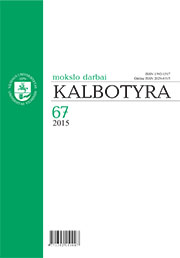Neepisteminis modalumas lietuvių ir anglų mokslo kalboje: kiekybiniai ir kokybiniai vartosenos ypatumai
Nonepistemic modality in English and Lithuanian academic discourse: quantitative and qualitative perspectives
Author(s): Jolanta ŠinkūnienėSubject(s): Language studies, Language and Literature Studies, Comparative Linguistics, Baltic Languages
Published by: Vilniaus Universiteto Leidykla
Keywords: root modality; academic discourse; modal verbs; cross-linguistic analysis; cross-disciplinary analysis;
Summary/Abstract: The aim of the present paper is to investigate the frequency distribution and semantic-pragmatic usage patterns of obligation and necessity modals should and turėti ‘have to’ in two science fields (humanities and (bio)medicine) and two languages (English and Lithuanian). Quantitative and qualitative approaches are employed alongside contrastive analysis to reveal the ways in which the two languages and two science fields overlap or differ with regard to the use of obligation and necessity modals as stance markers. The English language data is taken from the Academic language subcorpus of COCA, while the Lithuanian language data comes from Corpus Academicum Lithuanicum (www.coralit.lt), a specialized synchronic corpus of written academic Lithuanian (roughly 9 million words). The first part of the paper looks at the distribution and frequency patterns of the obligation and necessity modals under study investigating disciplinary and language specific variaton in their use. In all of its uses turėti ‘have to’ is equally common in both the humanities and (bio)medical discourse. However, the two fields differ in how frequently they employ possessive and modal turėti ‘have to’, which is more frequent in its possessive use in (bio)medical texts. The humanities show a more or less equal distribution of the two meanings of turėti ‘have to’. A brief quantitative comparison with privalėti ‘must’ shows that this verb appears in Lithuanian academic discourse very rarely. The quantitative analysis of the English sub-corpus demonstrates that should is more frequent in medical discourse than in the humanities, which could be linked to a frequent recommendational function this modal verb performs in medical writing. Differently from privalėti ‘must’, must is not avoided in the English academic discourse. The second part focuses on the semantic-pragmatic differences in the ways obligation and necessity modals are used to create engagement in different disciplines and research cultures. The qualitative analysis based on a sample of randomly selected 600 cases of should and turėti ‘have to’ revealed that there are four major functions these modals perform in academic discourse: they are used to mark moral obligation or duty, give recommendations, describe procedures and instructions and organize discourse. It appears that researchers in different disciplines and cultures tend to emphasize professional rules, procedures and expectations of the professional community to a similar extent, at least so far as should and turėti ‘have to’ use shows. Recommendations expressed by should and turėti ‘have to’ are also frequent which signals the eagerness of researchers to offer recommended course of action or guidelines for future research. The most engaging use to indicate moral obligation or duty by should and turėti ‘have to’ is not frequent in research writing and is primarily characteristic of the humanities where researchers tend to construct more engaging relations than in the sciences (cf. Hyland 2002, 2005, 2008). Same is true for should in its discourse organizing function which is more frequent in the humanities. Finally, more additional contextual markers of author stance (hedges, directives, second person pronouns) accompanying should were observed in the English language texts which points towards more persuasiveness in research writing of Anglo-American tradition. Set within the context of other cross-linguistic and cross-disciplinary studies on author stance, this research might contribute to a better understanding of how academic rhetoric is influenced by both the disciplinary convention and cultural tradition.
Journal: Kalbotyra
- Issue Year: 2015
- Issue No: 67
- Page Range: 131-154
- Page Count: 24
- Language: Lithuanian

